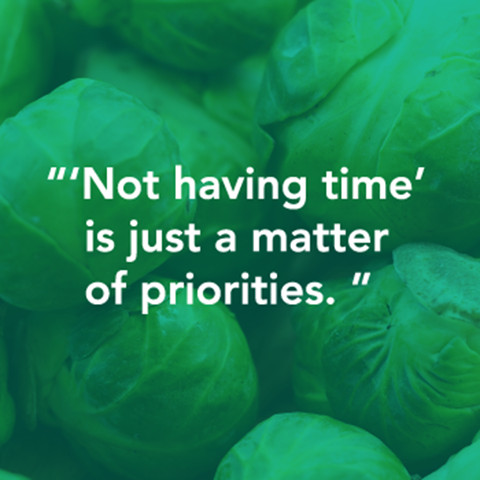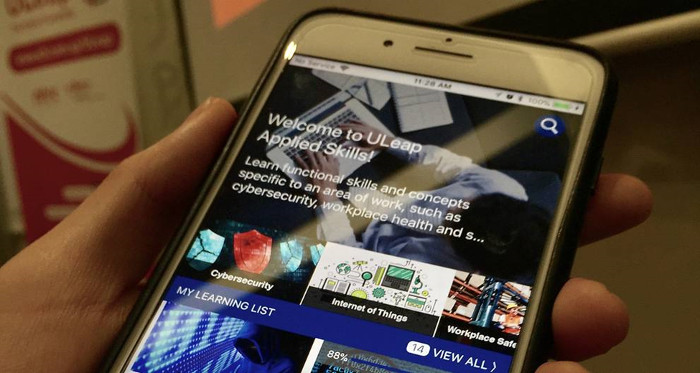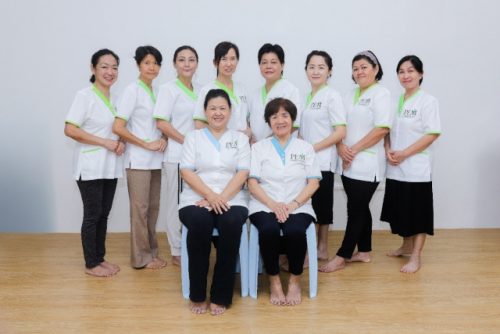Walt Disney taught himself to draw through correspondence school and continued to learn throughout his life.
Bill Gates often picks up a copy of TIME to read to ensure that he learns something he didn’t know before.
Mr Lee Kuan Yew started learning how to use the computer at 70. Even at the ripe age of 90, he was still having Chinese lessons with his Chinese tutor.
What do all these successful people have in common?
 Image source: Greatlist
Image source: Greatlist
But before you wave off this lofty idea and say, “I don’t have time!” – hear us out.
We get it.
Having to juggle career and family can be a herculean task. It is not always smooth-sailing, it is not always the most pleasant experience and it is certainly not easy.
Just as you’re about to step into the boardroom with an important meeting with potential investors, your child’s school teacher calls you to tell you that he is sick and needs to be taken home immediately.
As working parents, we have struggled with such moments.
In a quest to find out how parents can better balance their career and family, we speak to a working father with two young children.
 Desmond with his wife, Pamela, and his newborn daughter, Stephanie. Image source: Desmond Choo Facebook
Desmond with his wife, Pamela, and his newborn daughter, Stephanie. Image source: Desmond Choo Facebook
Meet 40 year-old Singaporean Desmond Choo.
Besides being the Director of the Youth Development Unit in NTUC (aka Young NTUC), Executive Secretary of the Attractions, Resorts & Entertainment Union (AREU), and lobbying for women and family issues in Parliament, Desmond is also a father to his two young children, 3 year-old Sara and 2 months-old Stephanie.
So how does this father find time to learn and keep ahead on top of all his work and family responsibilities?
#1 Learn On The Go
 NTUC’s ULeap mobile app has bite-sized training courses for learning on-the-go. Image source: Channel News Asia
NTUC’s ULeap mobile app has bite-sized training courses for learning on-the-go. Image source: Channel News Asia
“For me to continue to add value, learning is critical.”
“Podcast is my best friend,” the youthful-looking dad exclaims with a smile.
This was a tip he picked up from other top executives who set themselves a targeted number of books to finish reading within a year.
Knowing that he doesn’t have the luxury of time to sit down and read through The Economist, he listens to his Podcast and Audiobooks regularly when he is on the go. This gives him a good run-through of current affairs and keeps him updated on what’s happening around.
“Technology can be a great enabler. Although it might take a while to learn through listening, you can get there. While you’re taking the public transport, plugin, listen and learn,” Desmond says.
Desmond recommends TedTalks for good industry insights. He plugs in to Coursera daily, when he goes to the gym or while he is jogging.
“In order to stay relevant in our jobs, we must be keenly aware of how your industry is transforming. Today, a Business Developer no longer just looks at investment opportunities, they may need to advise how business processes must change in order for it (their investments) to grow.”
“Think across industries and across job functions. How does this eventually lead to solving problems? Explore more industries and you will find that your competencies cut across.”
#2 Reach Out And Get Connected
Another way to stay relevant is to learn from fellow peers or take a leaf from those who have ‘been there’.
Young NTUC’s Youth Career Network Sessions is one example of the Labour Movement’s many programmes to connect people across industries and skill levels.
Catered to busy young executives, each session is jam-packed one and a half hour sessions where you get to meet like-minded startup owners, successful professionals and ask whatever questions you want.
“Don’t just be confined to what you are doing now. For example, the IT industry is very volatile. But every single industry has a demand for IT too, such as the healthcare industry. If you have the base skills as a software developer, are you able to apply them across different sectors?”
For stay-at-home mums who want to return to the workforce, NTUC U Family runs a Returners Programme with employers on paid work trials with structured on-the-job trainings, mentoring and family-friendly workplace policies.
Having the networks that give busy working parents access to skills and jobs in demand, plus advice from mentors that you can’t find on Google, will save you time and effort.
#3 Deliberately Block Out Family Time In Your Daily Schedule to Balance Family and Work
Planning for time for his family is as important as planning time for work.
In Desmond’s daily schedule, there are blocks of time which are fixed and ‘untouchable’.
For example, weekday early mornings are blocked out, because it is the time when he sends his daughter to school. Weekends such as Saturday nights or Sunday mornings are blocked out for family time, unless he has to attend a very important function.
“We need to plan to make time (for activities) which are important to us and make it a key part in our schedule. If we don’t do so, other things will get prioritized on top of them,” says Desmond.
#4 Don’t Neglect Your Health
 Desmond (middle, in black) taking a morning brisk walk with some of residents at Changi Beach Park. Image source: Desmond Choo Facebook
Desmond (middle, in black) taking a morning brisk walk with some of residents at Changi Beach Park. Image source: Desmond Choo Facebook
Even before meeting him in person, I could tell that Desmond was someone who keeps a tab on his fitness. While waiting for him, I was told by his assistant that he is on his way up to the meeting room. He took the flight of stairs instead of the lift. And we were up on the fourteenth floor.
He later shares how he integrates his personal workout into his grassroots activity – brisk walking with the residents. Before the grassroots activity takes place, Desmond would go to the venue 45 minutes ahead of time to his own exercise, which is jogging. After his run, he will meet up with his residents and walk with them.
#5 Know That Quantity Time Matters Too
 Desmond and his first daughter, Sarah. Image source: Desmond Choo Facebook
Desmond and his first daughter, Sarah. Image source: Desmond Choo Facebook
Desmond believes it is possible for parents to manage their families and career. However, parents must be realistic that there are certain trade-offs, and must be prepared to spend quantity time with their children.
“As much as we like to say that quality time matters, there is also no substitute for quantity time. Because certain things take time, children don’t suddenly learn to walk.”
He recounts a time when he took childcare leave to be with his daughter when she was sick. Just by being with her and spending time with her, forged a closer bond between them. These kinds of moments matter too, he says.
“The time you spend with each other, it doesn’t have to be activity-filled. Be with each other, whether it’s reading or watching YouTube videos together.”
#6 Observe And Learn From Other Parents
 Desmond (in white) with other parents at a Tampiness grassroots event. Image source: Desmond Choo Facebook
Desmond (in white) with other parents at a Tampiness grassroots event. Image source: Desmond Choo Facebook
Learning and bonding with your child – there is a possibility of mixing the two.
At Tampines Library, he noticed that children read at the children’s corner, while their parents sit at their own space nearby to read.
“It is a good parenting tool because children know that you are also learning, as much as you are asking them to learn.”
He recalled once when his daughter saw him doing work and asks him what he was doing. After explaining to her that “daddy is learning”, she later picked up a book and pretended to “learn”.
“It sets the example for our kids, this concept of continuous learning. It also helps them learn to be independent because they know daddy and mummy need their own time to learn too.”
It’s Not Easy But…
Desmond is aware that young parents feel trapped. It’s not easy to make a career transition when they are real bills to pay and other risks involved.
Understanding that young parents require more support in the new economy as they can be considered as a “doubled sandwiched” – middle-income, having to take care of young children and older parents, Desmond proposed to the Ministry of Finance in the recent Budget 2018 Debate and Committee of Supply to:
- Review how subsidies for childcare and student care are structured (as families have to cope with rising costs of looking after children and meet the needs of healthcare and other forms of care for their aged parents)
- Make eldercare or family-care leave mandatory
- Enhance student care support to include parents up to 50th percentile income tier
He also called for a deeper and wider adoption of Flexible Work Arrangements for working parents, and urged the government to consider giving young parents with newly born children the legislated right to request for flexible work arrangements in the child’s first year of birth.
Preparing Our Children For The Future

As we wrap up our interview, we go back to how he parents his children and what skills he hopes to impart in both of them.
“The ability to learn in an agile manner, the ability to think across industries and job functions, the ability to think ahead and know-how all these will eventually lead to better solving problems – that’s what our kids will need in the future.”
As parents, how do we help them grow up with such skills?
“By helping them to integrate different types of knowledge and applying it across disciplines.”
He shares an example of how his daughter blends her play dough with her pencil drawing and encourages it as a form of creative interpretation.
Next, is to keep the ‘whys’ in our children going, even though it might never seem to end. Build their sense of curiosity and help them to understand why.
The busy working dad is mindful of play time or TV time at home because knows these moments are opportunities for him to teach them life’s biggest lessons.
Lastly, which he admits is a tough one, is to help them look at things from a broader perspective – that there is no one single way.
“How do I give her the ability to weigh issues, to think critically, the ability to see different perspectives of the same issue, and with the rights values, come to make a decision? These are the core skills I want them to have. This is the approach I take, and when they ask, I offer the best explanation I can.”
And how does he find the time to instill and teach these values?
Anytime – when the opportunity arises.
By Michelle Ang.
* * * * *
Like what you see here? Get parenting tips and stories straight to your inbox! Join our mailing list here.
Want to be heard 👂 and seen 👀 by over 100,000 parents in Singapore? We can help! Leave your contact here and we’ll be in touch.





















































